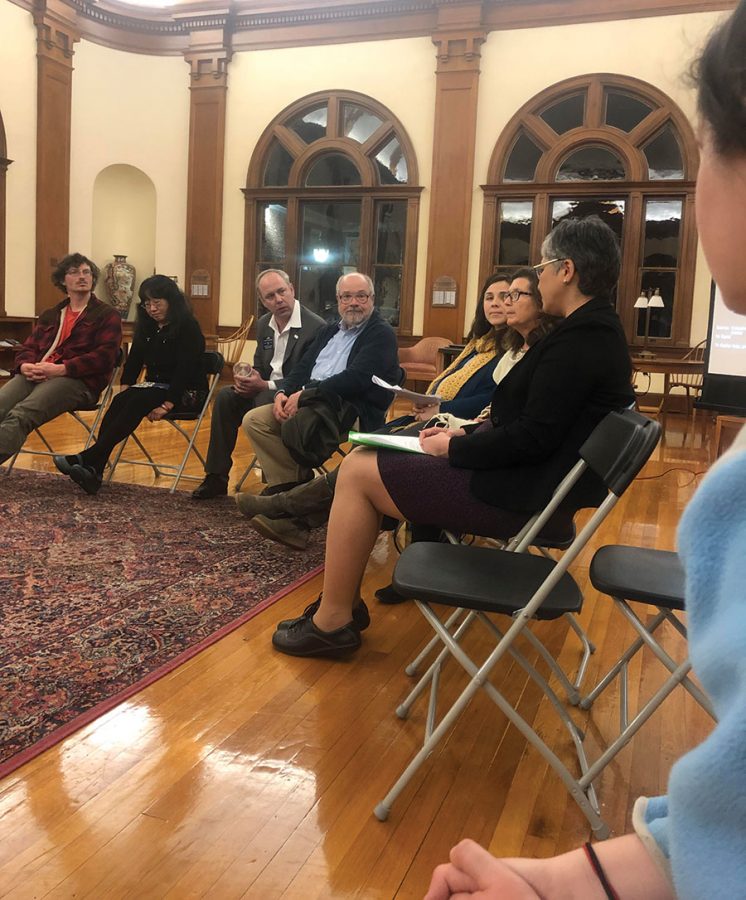Food Justice lecture builds positive discussion
Guilford community members gathered on Thursday, Jan. 31, 2018 to discuss combating food insecurity.//Photo by DaeQuan Fitzgerald/The Guilfordian
North Carolina is ranked the No. 8 state in terms of food insecurity. The Greensboro-High Point metropolitan area continuously ranks as one of the areas with the most difficulty securing food based on a percentage of the total population.
These and other issues of local food insecurity were discussed at a Guilford lecture entitled, “Food Justice and Food Sovereignty through Entrepreneurship and Sustainable Food Systems,” on Thursday, Feb. 1. Guest speakers Dr. Chyi Lyi Liang, professor of agribusiness, applied economics and agriscience education at North Carolina Agricultural and Technical State University, and Casey Thomas ’10, an entrepreneur at the Renaissance Community Cooperative, shared their insights on how anyone can combat food insecurity, especially in their local area.
Liang serves as the co-director of the Center for Environmental Farming Systems, an organization that focuses on research and education in sustainable agriculture and community-based food systems.
During her presentation, Liang noted three reasons behind food insecurity, one of which is a lack of belief in the influence of community organizations.
“A lot of times people will say, ‘This is not going to work,’” said Liang. “People don’t want to help community organizations. They say, ‘You don’t have the numbers, the money, the type of talent needed’ … all you need is a heart to make it work.”
As noted by Liang, another cause of food insecurity is a lack of knowledge about what a food system is. The conventional view of the food system is that food is grown, sold and eaten. However, she challenged this belief by highlighting everything else that goes into food production.
“The food system starts with the environment, the climate, the condition and the people,” said Liang.
Thomas touched on this idea in her presentation about the accessibility of food. She began by recounting an anecdote about a grocery store on Phillips Avenue in Greensboro that was relocated, leaving the surrounding community without convenient access to a grocery store.
This led to the creation of the Renaissance Community Cooperative, a nonprofit organization that opened in October 2016 in the Phillips Avenue Plaza. The RCC is a 10,530 square foot full-service grocery store partnered with a variety of different foundations and organizations such as the City of Greensboro, Self-Help Ventures Fund, Cooperative Development Services and the Community Foundation of Greater Greensboro.
“Cooperatives have been a tool for economic survival and for thriving,” said Thomas. “(They are) a business model. It doesn’t matter what you sell. What’s important is that a cooperative is owned by the people who use the business (in the community).”
Students who attended the event learned about food security and community involvement.
“I learned that there is a very big food problem in North Carolina,” said sophomore and public health major Tyrek Speller. “If we could educate people by increasing their awareness, we could help the food shortage and conserve the food that we have here.”
Audrey Waggoner, the Guilford food access outreach coordinator, noted that she benefitted from hearing the perspectives of the guest speakers and those in attendance.
“I really enjoyed hearing Dr. Liang’s personal stories as well as Casey’s. I think they are both inspirational people,” said Waggoner. “There’s a synergy … from bringing people from different perspectives and backgrounds. It’s more helpful to have a collection of resources to work with instead of being in your own little corner.”
Overall, she was pleased with the results of the lecture.
“I think the turnout was (good),” said Waggoner. “It’s hard to get students out on a chilly Thursday night, but I think the intent and the spirit of the room was in the right place.”









